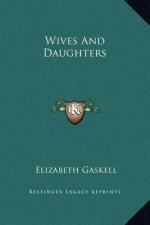’I told you so. Now didn’t I say what a good, suitable thing this affair between Gibson and Clare would be! I don’t know when I have been so much pleased. You may despise the trade of match-maker, my lady, but I am very proud of it. After this, I shall go on looking out for suitable cases among the middle-aged people of my acquaintance. I shan’t meddle with young folks, they are so apt to be fanciful; but I have been so successful in this, that I do think it is a good encouragement to go on.’
‘Go on—with what?’ asked Lady Cumnor, drily.
‘Oh, planning—You can’t deny that I planned this match.’
’I don’t think you are likely to do either much good or harm by planning,’ she replied, with cool, good sense.
‘It puts it into people’s heads, my dear.’
’Yes, if you speak about your plans to them, of course it does. But in this case you never spoke to either Mr. Gibson, or Clare, did you?’
All at once the recollection of how Clare had come upon the passage in Lord Cumnor’s letter flashed on his lady, but she did not say anything about it, but left her husband to flounder about as best he might.
‘No! I never spoke to them; of course not.’
’Then you must be strongly mesmeric, and your will acted upon theirs, if you are to take credit for any part in the affair,’ continued his pitiless wife.
’I really can’t say. It’s no use looking back to what I said or did. I’m very well satisfied with it, and that’s enough, and I mean to show them how much I’m pleased. I shall give Clare something towards her rigging out, and they shall have a breakfast at Ashcombe Manor-house. I’ll write to Preston about it. When did you say they were to be married?’
’I think they’d better wait till Christmas, and I have told them so. It would amuse the children, going over to Ashcombe for the wedding; and if it’s bad weather during the holidays I’m always afraid of their finding it dull at the Towers. It’s very different if it’s a good frost, and they can go out skating and sledging in the park. But these last two years it has been so wet for them, poor dears!’
’And will the other poor dears be content to wait to make a holiday for your grandchildren? “To make a Roman holiday.” Pope, or somebody else, had a line of poetry like that. “To make a Roman holiday,"’—he repeated, pleased with his unusual aptitude at quotation.
’It’s Byron, and it’s nothing to do with the subject in hand. I’m surprised at your lordship’s quoting Byron,—he was a very immoral poet.’
‘I saw him take his oaths in the House of Lords,’ said Lord Cumnor, apologetically.
‘Well! the less said about him the better,’ said Lady Cumnor. ’I have told Clare that she had better not think of being married before Christmas; and it won’t do for her to give up her school in a hurry either.’




